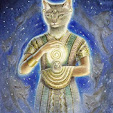Giacomo Puccini: TOSCA
Libretto by Giuseppe Giacoso and Luigi Illica after Victorien Sardou's play LA TOSCA
Cast
Floria Tosca Amanda Echalaz
Mario Cavaradossi Julian Gavin
Scarpia, Chief of Police Anthony Michaels-Moore
Cesare Angelotti Pauls Putnins
Sacristan Jonathan Veira
William Robert Allenby 3, 7 July
Spoletta, a police agent Christopher Turner
Sciarrone James Gower
Gaoler Christopher Ross
Shepherd-boy Harry Stanton
Joseph Spencer-Fry
20, 27 May, 2, 11, 24 June, 3, 10 July
Sacristan's apprentice James Rich
Teddy Favre-Gilly
20 May 11 June
Chorus and orchestra of English National Opera
Conductor Edward Gardner
This is a much-heralded new production by Catherine Malfitano, herself once a notable exponent of the role.
The staging is quite conventional, not particularly spectacular except in the final moments of Act 1, in which the Cardinal's robe has an exaggeratedly long train....during the interval some of us discussed whether this was intended in a spirit of dramatic irony.

Perhaps it wasn't a particular original staging, but Malfitano's experience as a performer has evidently given her an insight into the characterisation required, for both Tosca (Amanda Echalaz) and Cavaradossi (Julian Gavin). Anthony Michaels-Moore was a little less satisfactory, for reasons I shall come to in due course.
Julian Gavin also looked the part, the audience could really believe in Cavaradossi as a young, idealistic artist; his rendition of 'Recondita armonia' was sung in an almost lightweight, carefree tone, as Cavaradossi at this stage is completely wrapped up in his art and his love, unaware of the turns events are about to take.

(In the image, you see the Sacristan with his apprentice; in the original libretto by Giacoso and Illico, the Sacristan of course doesn't have an apprentice, he just mutters to himself, but as the addition of the boy didn't detract from the drama, we can let it pass).
Gradually, as the drama unfolds, Gavin's voice becomes darker, more passionate, in his defiance of Scarpia, and the ringing tones of 'Vittoria, Vittoria!' as he manages to stagger upright - but obviously this exhausts Cavaradossi's last reserves of strength, and the henchmen drag him off.
'E lucevan le stelle' was delivered with heart-rending passion, and the orchestra, under Edward Gardner, imbued the aria with further passion, especially in the woodwinds, so that I felt tears pricking my eyelids......I love singers who are able to perform these set-pieces so that they are not just showcases for their vocal abilities (though Gavin's abilities are considerable!) but as if they really meant it, so that the audience feels Cavaradossi's suffering and despair.
The same applies to Amanda Echalaz as Tosca. Even in the first Act, her voice has a darker quality than that of the tenor, but then she is a more passionate character....this is what Scarpia works on, of course.
Before turning to discussion of Act II, I have to say that, in comparison with the other two principals, Anthony Michaels-Moore as Scarpia was rather disappointing. His first entrance was impressive enough, but he allowed 'Tosca, tu mi fai dimenticare Iddio' to be almost swallowed up by the orchestra. We knew he was saying this, as the surtitles indicated, but - I have seen Scarpias who looked as if they were going to have an orgasm of hate, right there in the church, and in comparison Michaels-Moore seemed somewhat benign. I think the problem was that he allowed himself to fall into the trap of playing Scarpia as an unsubtle "Victoria melodrama" type villian (well, to be fair, Sardou's play IS more or less a Victorian melodrama).
However, the swaggering and posturing was more effective in the second Act, and also more convincing in the context. He sang well, but with perhaps not quite as much depth of feeling as the other two.
I was very impressed by Echalaz's performance of "Vissi d'arte" (translated as "Love and music, these I have lived for"). As I indicated in discussion of "E lucevan le stelle", it could just be performed as a set-piece directed towards the audience, but she made more of it than this, imbuing it with great depth of feeling,and really as if it were an internal monologue....how can things have ended up like this, when all I lived for was my art.....and really despairing as she realises that Scarpia is not going to allow her a way out.
Interestingly, at the end of the scene, the usual stage business of her lighting the candles for the dead Scarpia is omitted. She sets the crucifix straight on Scarpia's death, and as the last few chords sound in the orchestra, she huddles on the chair, shuddering with horror at what she has done.
The supporting roles were all well and competently sung, and the orchestral playing could hardly have been surpassed, with such taut construction and attention to detail.
This is an image of the final act, on the gloomy battlements of the Castel sant'Angelo.






















No comments:
Post a Comment